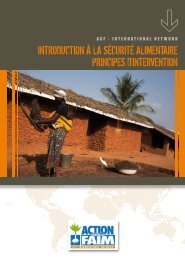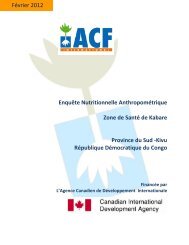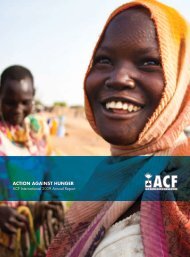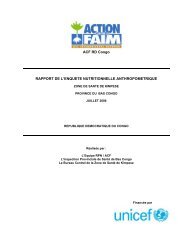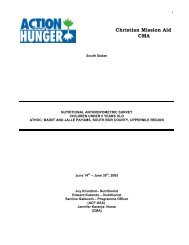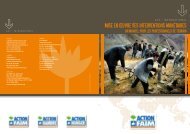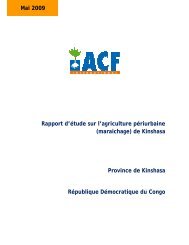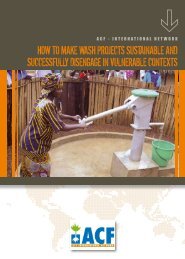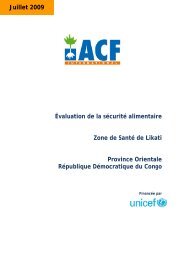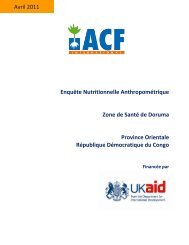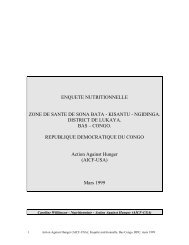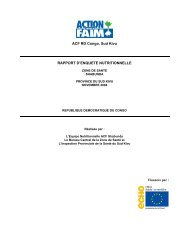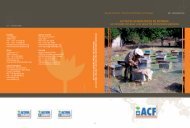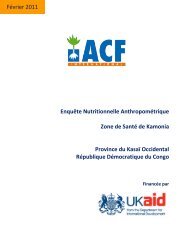Participatory Evaluation of our 2008 - Action Against Hunger
Participatory Evaluation of our 2008 - Action Against Hunger
Participatory Evaluation of our 2008 - Action Against Hunger
You also want an ePaper? Increase the reach of your titles
YUMPU automatically turns print PDFs into web optimized ePapers that Google loves.
Institutional<br />
• FFS shorten the times it takes to get research from station to<br />
adoption in farmer fields by involving farmers in their own<br />
experimentation<br />
• Enhance the capacity <strong>of</strong> extension workers to serve as<br />
technically skilled and group sensitive facilitators <strong>of</strong> farmer’s<br />
experiential learning.<br />
• Increase the competency <strong>of</strong> extension services to provide<br />
farmer education that responds more effectively to local<br />
res<strong>our</strong>ces and conditions<br />
• Contribute information on the replicability and effectiveness<br />
<strong>of</strong> FFSs as an alternative and sustainable mechanism for<br />
extension service delivery<br />
Community<br />
• Empower farmers with knowledge and skills in farming<br />
• Sharpen farmer ability in making logical decisions on what<br />
works best for them, based on their own observations <strong>of</strong><br />
experimental and validation plots<br />
• Promote group initiatives that are able to solve own<br />
community problems and facilitate the work <strong>of</strong> other<br />
development players by providing a demand driven system<br />
• Establish high level <strong>of</strong> networking by groups to handle<br />
emerging follow up with community activities [marketing,<br />
res<strong>our</strong>ce mobilization processing, contract farming, etc]<br />
Based on enc<strong>our</strong>aging participant report and positive feedback from FAO on the relative strengths <strong>of</strong> the ACF farmer<br />
field schools, ACF plans to expand the approach in Lango sub-region during 2009 and to pilot the initiative in Acholi<br />
sub-region at the same time. Before scaling up, however, an evaluation is required to review achievement and improve<br />
the approach.<br />
<strong>Evaluation</strong> Objectives<br />
1. To evaluate the FFS methodology and process for 12 groups in Minakulu and Okwang sub-counties.<br />
2. To evaluate FFS impact on household food security and livelihoods, according to qualitative and quantitative data<br />
analysis generated through questionnaires, focus groups, and interviews.<br />
3. To identify existing strengths and weaknesses in ACF FFS implementation and M&E.<br />
4. To involve ACF staff in an applied learning opportunity and identify training needs improved FFS implementation<br />
and M&E.<br />
5. To develop specific recommendations for improved FFS programming in 2009.<br />
<strong>Evaluation</strong> Process<br />
Phase one <strong>of</strong> the evaluation will build on a recently concluded quantitative evaluation <strong>of</strong> the farmer field school<br />
approach in Uganda, completed by FAO in July <strong>2008</strong>. Sections <strong>of</strong> the FAO data collection tool will be used in order to<br />
ensure comparability <strong>of</strong> ACF results with national trends identified in the FAO data. ACF field extension workers will<br />
be briefed on the evaluation objectives and trained in use <strong>of</strong> the quantitative data collection tool before collecting data<br />
from the 12 FFS groups. If possible, one control group (not participating in the FFS) will participate from each location<br />
for further comparative analysis.<br />
Phase two <strong>of</strong> the evaluation will utilise initial analysis <strong>of</strong> the quantitative data as the basis for focus group discussions in<br />
each FFS location so that causes, effects, preferences, etc can be understood in greater detail. Seasonality <strong>of</strong> activities<br />
and inputs will be analysed, preferably building upon a seasonal calendar already developed by ACF field extension<br />
workers. Matrix scoring and proportional piling could be included in the focus groups, depending on initial results from<br />
the quantitative data collection and subsequent identification <strong>of</strong> analytical priorities. The possibility <strong>of</strong> genderdisaggregated<br />
groups will also be explored to consider possible differences in gender impact <strong>of</strong> FFS activities on<br />
women and men.<br />
Key Documents<br />
• ACF-FAO letters <strong>of</strong> agreement and project proposals<br />
• ACF progress and final report to FAO<br />
• FAO evaluation <strong>of</strong> farmer field schools in Uganda<br />
• Draft logical framework for 2009 ACF FFS M&E<br />
• Quantitative data analysis results <strong>of</strong> ACF <strong>2008</strong> output indicators<br />
<strong>Action</strong> <strong>Against</strong> <strong>Hunger</strong> Uganda - 51 - Farmer Field School <strong>Evaluation</strong>



